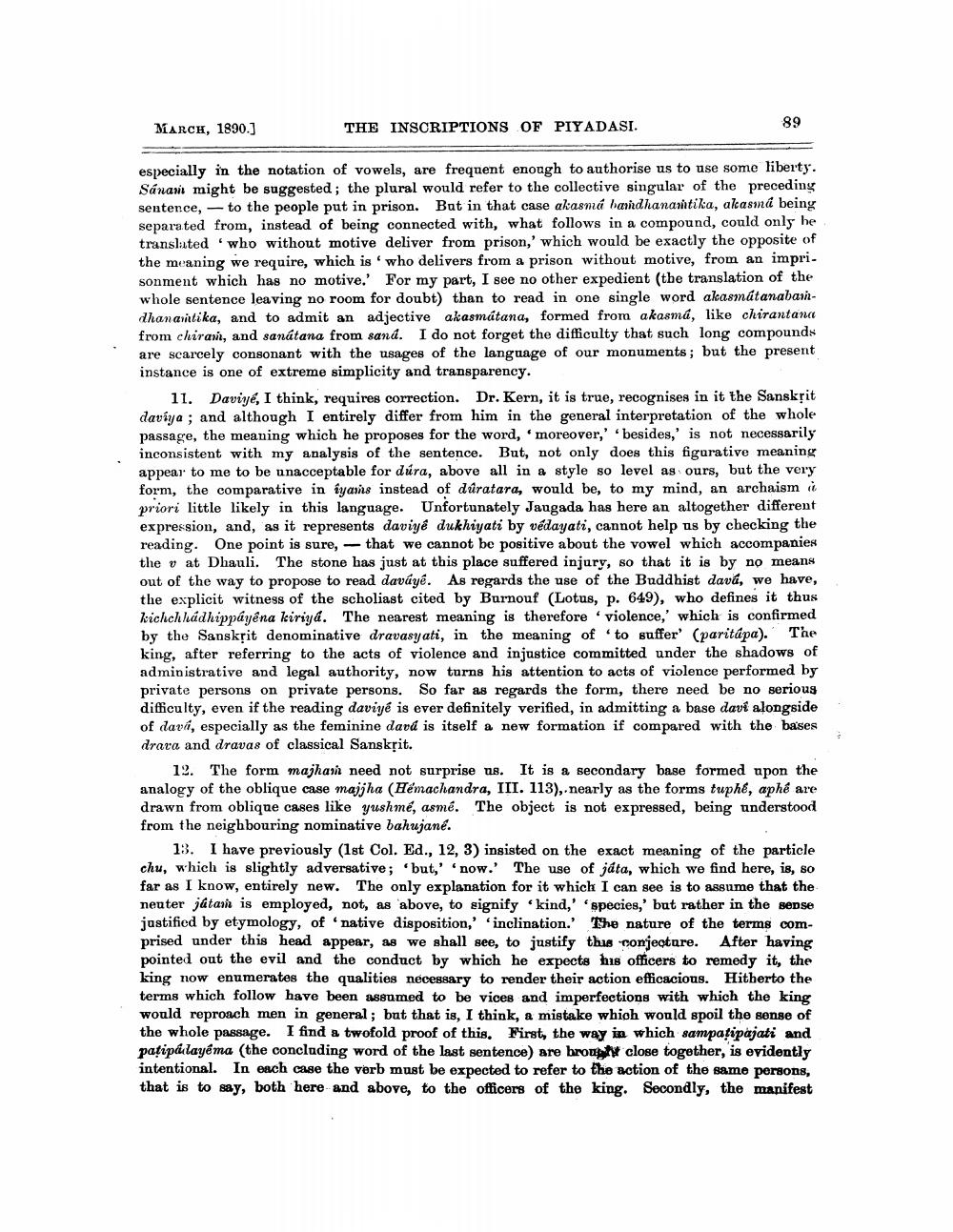________________
MARCH, 1890.]
THE INSCRIPTIONS OF PIYADASI.
-
89
especially in the notation of vowels, are frequent enough to authorise us to use some liberty. Sanam might be suggested; the plural would refer to the collective singular of the preceding sentence, to the people put in prison. But in that case akasmá handhanantika, akasma being separated from, instead of being connected with, what follows in a compound, could only he translated who without motive deliver from prison,' which would be exactly the opposite of the meaning we require, which is 'who delivers from a prison without motive, from an imprisonment which has no motive.' For my part, I see no other expedient (the translation of the whole sentence leaving no room for doubt) than to read in one single word akasmatanabaidhanamlika, and to admit an adjective akasmátana, formed from akasmá, like chirantana from chiram, and sanátana from sand. I do not forget the difficulty that such long compounds are scarcely consonant with the usages of the language of our monuments; but the present instance is one of extreme simplicity and transparency.
"
11. Daviye, I think, requires correction. Dr. Kern, it is true, recognises in it the Sanskrit daviya; and although I entirely differ from him in the general interpretation of the whole passage, the meaning which he proposes for the word, moreover,' 'besides,' is not necessarily inconsistent with my analysis of the sentence. But, not only does this figurative meaning appear to me to be unacceptable for dúra, above all in a style so level as ours, but the very form, the comparative in iyams instead of dûratara, would be, to my mind, an archaism priori little likely in this language. Unfortunately Jaugada has here an altogether different expression, and, as it represents daviyê dukhiyati by védayati, cannot help us by checking the reading. One point is sure, that we cannot be positive about the vowel which accompanies thevat Dhauli. The stone has just at this place suffered injury, so that it is by no means out of the way to propose to read davayê. As regards the use of the Buddhist davá, we have, the explicit witness of the scholiast cited by Burnouf (Lotus, p. 649), who defines it thus kichchhadhippayêna kiriya. The nearest meaning is therefore violence,' which is confirmed by the Sanskrit denominative dravasyati, in the meaning of to suffer' (paritápa). The king, after referring to the acts of violence and injustice committed under the shadows of administrative and legal authority, now turns his attention to acts of violence performed by private persons on private persons. So far as regards the form, there need be no serious difficulty, even if the reading daviyé is ever definitely verified, in admitting a base davi alongside of davá, especially as the feminine davá is itself a new formation if compared with the bases drava and dravas of classical Sanskrit.
12. The form majham need not surprise us. It is a secondary base formed upon the analogy of the oblique case majjha (Hémachandra, III. 113),. nearly as the forms tuphé, aphe are drawn from oblique cases like yushmé, asme. The object is not expressed, being understood from the neighbouring nominative bahujané.
13. I have previously (1st Col. Ed., 12, 3) insisted on the exact meaning of the particle chu, which is slightly adversative; but,' 'now.' The use of játa, which we find here, is, so far as I know, entirely new. The only explanation for it which I can see is to assume that the neuter játam is employed, not, as above, to signify kind,' 'species,' but rather in the sense justified by etymology, of 'native disposition,' 'inclination.' The nature of the terms comprised under this head appear, as we shall see, to justify this conjecture. After having pointed out the evil and the conduct by which he expects his officers to remedy it, the king now enumerates the qualities necessary to render their action efficacious. Hitherto the terms which follow have been assumed to be vices and imperfections with which the king would reproach men in general; but that is, I think, a mistake which would spoil the sense of the whole passage. I find a twofold proof of this. First, the way in which sampatipajati and patipalayema (the concluding word of the last sentence) are brought close together, is evidently intentional. In each case the verb must be expected to refer to the action of the same persons, that is to say, both here and above, to the officers of the king. Secondly, the manifest




